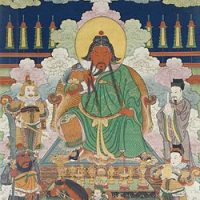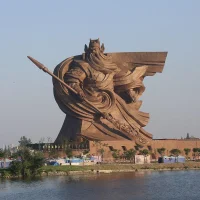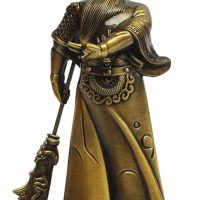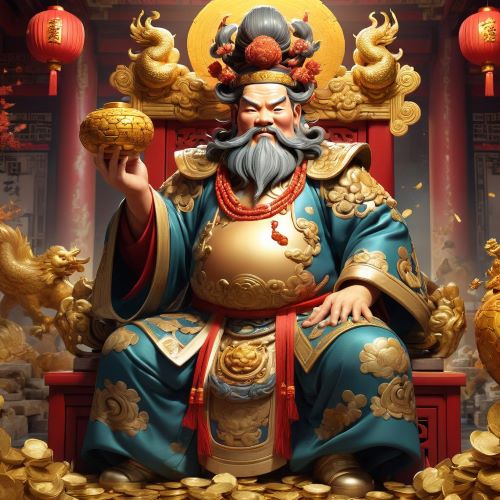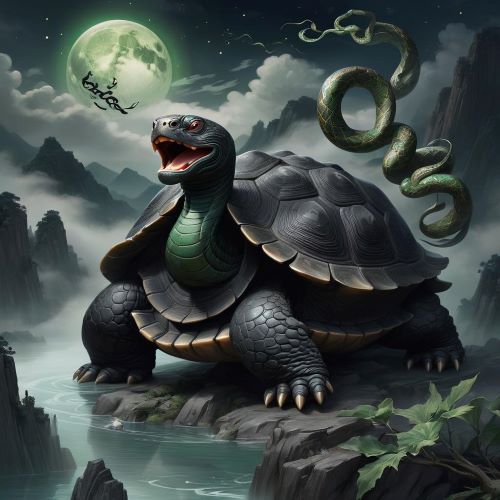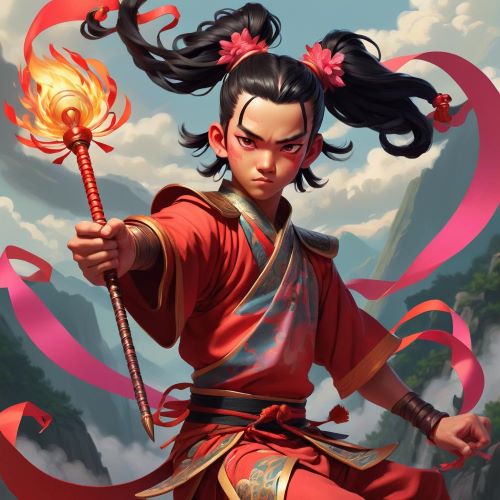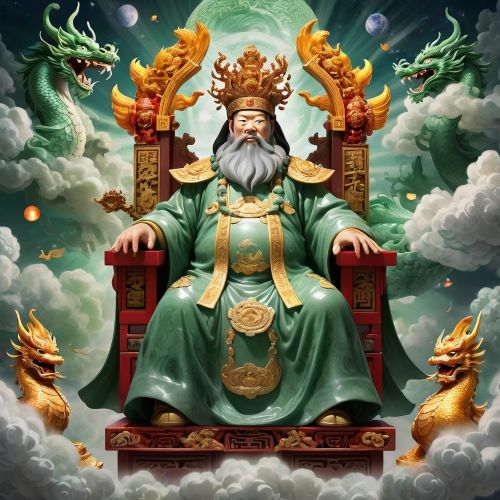Guan Yu : The Immortal Chinese General of Loyalty and Valor
Listen
At a glance
| Description | |
|---|---|
| Origin | Chinese Mythology |
| Classification | Gods |
| Family Members | Guan Ping, Guan Xing, Guan Yinping (Children) |
| Region | China |
| Associated With | War, Immortality |
Guan Yu
Introduction
Guan Yu stands as one of the most enduring figures in Chinese history and mythology, celebrated for his unshakable loyalty, discipline, and moral clarity. Born around 160 CE in Shanxi Province during the turbulent final years of the Eastern Han dynasty, he came of age in a world marked by rebellion and shifting power. This unstable environment shaped his path and solidified the virtues that would define him throughout the Three Kingdoms period. His sworn brotherhood with Liu Bei and Zhang Fei, immortalized through the Oath of the Peach Garden, marked the beginning of a lifelong commitment to righteousness and shared ideals. Although he was executed in 220 CE during a conflict with the state of Wu, his legacy only grew stronger, ultimately elevating him to divine status in Taoism, Buddhism, and Chinese folk religion. Today, Guan Yu serves as both a historical hero and a mythological guardian whose presence resonates through temples, literature, and popular culture.
Physical Traits
Descriptions of Guan Yu in historical texts and the later literary classic Romance of the Three Kingdoms established the foundation for his iconic appearance. He is traditionally portrayed as tall, broad-shouldered, and commanding in presence, with a red face symbolizing integrity, courage, and spiritual fire. Equally famous is his long, flowing beard, admired so widely that it earned him the title “Beautiful Beard.” His piercing eyes and composed expression reflect a warrior who embodied inner discipline and unwavering resolve. Guan Yu is almost always depicted wielding the Green Dragon Crescent Blade, a massive polearm believed to weigh over 80 catties, though historians note that the exact weight is likely exaggerated for dramatic effect. His green robes, often featured in religious iconography, connect him to the wood element in Chinese cosmology and reinforce his role as a figure of renewal, moral clarity, and strength.
Family
Little is known about Guan Yu’s parents, but his own family is well represented in historical and literary sources. His eldest adopted son, Guan Ping, followed him into military service and remained faithfully at his side until their execution by forces loyal to Sun Quan. His younger sons, including Guan Xing, continued to serve the state of Shu Han under Liu Bei and later Zhuge Liang, preserving the family’s reputation for loyalty and military skill. Legends also speak of a daughter named Guan Yinping, though she is not listed in historical records. Beyond blood ties, the most significant relationship in Guan Yu’s life was his oath-bound brotherhood with Liu Bei and Zhang Fei. This bond became the central moral narrative of the Three Kingdoms tradition, representing loyalty that surpassed family and endured hardship, exile, and war. Their alliance is still celebrated as a model of brotherhood and moral fidelity.
Other names
Over the centuries, Guan Yu accumulated numerous names and titles that reflect his transformation from mortal general to cultural icon. His courtesy name was Yunchang, a standard form of address among Han elites. In folk tradition, he is affectionately known as Guan Gong, meaning “Lord Guan,” a title that conveys respect and familiarity. His deification earned him the grand title Guan Di, or “Emperor Guan,” used widely in Taoist temples. Another revered title, Guan Sheng Di Jun, describes him as a holy ruler and divine protector. These names highlight the broad range of roles he plays across belief systems, from historical hero to patron deity of justice, martial arts, oath-taking, business ethics, and law enforcement.
Powers and Abilities
Guan Yu’s abilities combine historical reality with legendary exaggeration, resulting in a figure who embodies both human excellence and supernatural potential. Historically, he was recognized as a formidable warrior and an expert in cavalry tactics, siege warfare, and battlefield discipline. He was admired for his strategic insight, calm judgment, and ability to inspire loyalty in his troops. In literature and mythology, these qualities were magnified into extraordinary powers. He was said to be able to defeat multiple enemies in a single sweep of his blade, withstand wounds without faltering, and maintain absolute moral clarity even in dire circumstances. After his death and deification, his abilities expanded into the spiritual realm. As the God of War, he became a divine guardian of justice, protector of cities, punisher of corruption, and patron of scholars, soldiers, and business leaders. Worshippers believe he can repel evil spirits, strengthen virtue, and guide those who seek moral discipline.
Modern Day Influence
In the modern era, Guan Yu’s influence permeates nearly every aspect of Chinese culture and extends far beyond the borders of China. His temples can be found across East and Southeast Asia, where he is worshipped as a guardian deity of loyalty, justice, and protection. Police stations, martial arts schools, and business establishments often place statues of Guan Yu near entrances to symbolize integrity and ward off deceit. His portrayal in media remains constant, appearing in films, dramas, comic books, and globally popular video games such as Dynasty Warriors and Total War: Three Kingdoms. His character continues to inspire discussions about ethical leadership, loyalty under pressure, and the nature of justice. Guan Yu’s image also appears in festivals, public art, and cultural exhibitions, reinforcing his status as a timeless symbol of righteousness. Although more than 1,800 years have passed since his death, his values and legend remain central to the cultural imagination of millions, making Guan Yu a rare historical figure who transcends time, geography, and belief systems.
Related Images
Source
China Highlights. (2025, October 28). Guan Yu: Stories, Facts, Death, Tomb, Chinese God of War. https://www.chinahighlights.com/travelguide/china-history/guan-yu.htm
Shaolin Kungfu. (2025, July 24). The Legend of Guan Yu: A Hero of Loyalty and Virtue. https://shaolin-kungfu.com/the-legend-of-guan-yu/
Royal Mint. (2023, December 31). Guan Gong, the Chinese God of Wealth. https://www.royalmint.com/chinese-new-year/guan-gong-the-chinese-god-of-wealth/
Luo, G. (1988). Romance of the Three Kingdoms (C. H. Brewitt-Taylor, Trans.). Foreign Languages Press. (Original work published 14th century).
Schipper, M., Ye, S., & Yin, H. (Eds.). (2025). China’s Creation and Origin Myths: Cross-Cultural Explorations in Oral and Written Traditions. Cambridge University Press.
Cheng, Y. (2024). An ethnography of construction and characteristics of Chinese traditional deity images: A case study of Guan Yu. Chinese Sociology Journal, 15(2), 101-120. https://pmc.ncbi.nlm.nih.gov/articles/PMC11133527/
Wang, Z. (2024). The Rise of the Hero: The Legend of Guan Yu. Chinese Mythology Worldwide. https://chinese.mythologyworldwide.com/the-rise-of-the-hero-the-legend-of-guan-yu/
STAR8S. (2025). The Biography of Guan Yu: A Legendary Chinese Hero of the Three Kingdoms. STAR8S History & Philosophy. https://star8s.com/blogs/history-philosophy/biography-of-guan-yu-legendary-hero-three-kingdoms
Luo, G. (1995). Romance of the Three Kingdoms (translated by Moss Roberts). University of California Press.
De Crespigny, R. (2007). A Biographical Dictionary of Later Han to the Three Kingdoms (23–220 AD). Brill Academic Publishers.
Ch’en, K. (1964). The Chinese Transformation of Buddhism. Princeton University Press.
Frequently Asked Questions
Why is Guan Yu worshipped as a god in Chinese culture?
He is worshipped because he represents loyalty, justice, and protection. Over time, his heroic life elevated him into the God of War and a guardian of righteousness.
What is the significance of Guan Yu’s Green Dragon Crescent Blade?
It symbolizes his unmatched strength and martial skill. The weapon became an iconic extension of his heroic identity in history and legend.
What does Guan Yu’s red face symbolize in mythology?
The red face represents loyalty, courage, and moral integrity, drawn from traditional opera symbolism rather than historical appearance.
Was Guan Yu’s oath of brotherhood with Liu Bei and Zhang Fei real?
The oath is not confirmed historically but is famous from Romance of the Three Kingdoms. It symbolizes unity and loyalty, central themes of his legend.
How is Guan Yu represented in modern films and video games?
He is shown as a powerful, honorable warrior with his iconic blade. His character appears widely in movies, TV dramas, and games like Dynasty Warriors.



